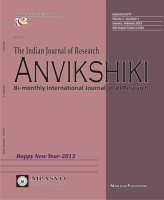Research Paper

A COMPARATIVE DIAGNOSTIC EVALUATION OF RHEUMATOID FACTOR BY DIFFERENT IMMUNOLOGICAL TECHNIQUES: LATEX AGGLUTINATION, GELATIN AGGLUTINATION, TURBIDOMETRY AND ELISA IN RHEUMATOID ARTHRITIS
Author: PRAMOD KUMAR VERMA*, USHA**, NILADRI***,, NAND KUMAR SINGH****, AND SHYAM KUMAR SARAF*****
*Department of Pathology [Institute of Medical Sciences] Banaras Hindu University Varanasi (U.P.) India. e-Mail: ugcaitrcbhu@gmail.com
**Department of Pathology [Institute of Medical Sciences] Banaras Hindu University, Varanasi (U.P.) India.
***Department of Pathology [Institute of Medical Sciences] Banaras Hindu University, Varanasi (U.P.) India.
****Department of Medicine [Institute of Medical Sciences] Banaras Hindu University Varanasi (U.P.) India.
*****Department of Orthopedics [University
Download PDF
Abstract : Rheumatoid Arthritis is an autoimmune disease with multifactorial triggering effects such as environment, infections and genetic influences. It causes polyarthritis of symmetrical joints especially the small joints of peripheral extremities (wrists, ankles and phalanges). Rheumatoid factor is a gold standard marker for the diagnostic utilization along with the ACR criteria. RF can be detected by different immunological techniques. Diagnostic capability of different techniques for RF detection in Rheumatoid arthritis has been studied to look at the best screening test for diagnosis. The latex agglutination and other tests such as gelatin agglutination, turbidometry and enzyme linked immunosorbant assays were taken to study their diagnostic utility. A total of 112 RA cases selected according to the ACR criteria were included in the study. Latex agglutination and other tests such as gelatin agglutination, turbidometry and enzyme linked immunosorbant assays (IgM, IgA and IgG) were done. Among all the techniques, the ELISA was found to be the best diagnostic marker as it detects the positive values in 69.6% of RA cases while the gelatin agglutination has also good capability to trace the RF positivity (64.3%) followed by turbidometry method which was positive for RF in 58.9% of RA case. The latex agglutination method was not proved to be having an effective evaluation quality as it was positive in only 34.8% cases of RA. Although the ELISA for the RF isotypes (IgM, IgA and IgG), if done collectively, is the best technique for diagnosis of RA. Gelatin agglutination and turbidometry are the next to claim good diagnostic capability while the latex agglutination is a qualitative and bad marker. In conclusion the screening technique for RF in Rheumatoid Arthritis should be either ELISA, gelatine agglutination or turbidometry. Gelatine agglutination is the most convenient method since it does not need any instrument and is sensitive, quantitative, cost effective and easy to evaluate.
Keywords:
Rheumatoid arthritis, RF, latex agglutination, ELISA, gelatin agglutination, turbidometry.